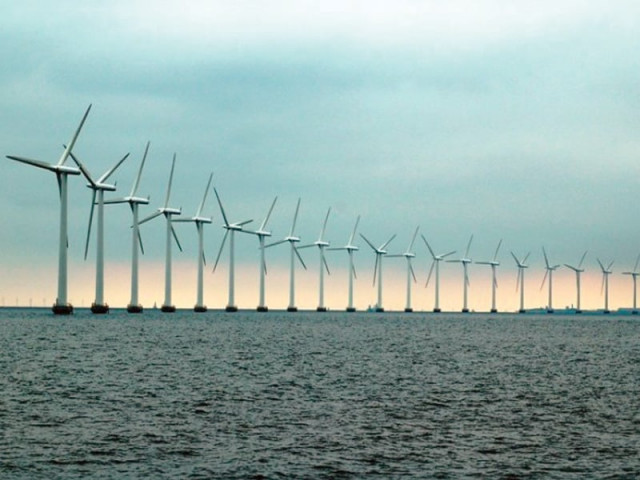The case for Pakistan to ramp up its renewable energy generation
Country's greenhouse gas emissions to quadruple by 2030 making it imperative for govt to focus on clean energy...

Pakistan has a huge potential for alternative energy generation, an estimated 2.9 million megawatt (MW) of solar energy and 340,000 MW of wind. PHOTO: FILE
It hangs inconspicuous, lightly swaying in the wind, powering Omair Bin Tahir’s small eyeglasses store, Choice Optics.
Perturbed by prolonged power outages especially during peak business hours, Tahir installed the 100 watts panel some six months ago.
Now he doesn't have to worry about having to turn customers away during the evening, the time when people start thronging the market and power outages commonly strike.
While his neighbouring shopkeepers try to help customers amid the din of noisy generators or charging-starved UPS systems, Tahir is relaxed because thanks to his solar panel he has enough power stored to run his shop’s fan and several bright lights for hours.
Karachi to face three more days of load-shedding
Mehmoodabad faces up to six hours of power outages daily, while unscheduled suspensions are also relatively common, leaving locals to turn to UPS systems or generators. A handful of households have installed solar panels but so far Tahir is the only shopkeeper using one.
“It was mostly a business-oriented decision for me. I needed something to address my electricity woes,” said Tahir. The shopkeeper is aware of the environmental benefits of clean energy but thinks people will shift to solar more to meet their energy needs than to help the environment – an issue that can be resolved if there is large-scale promotion of solar energy in the country.
Pakistan has huge potential for alternative energy generation, an estimated 2.9 million megawatt (MW) of solar energy and 340,000 MW of wind, according to Pakistan Alternative Energy Board as well as some 100,000 MW of hydropower. But around 70 per cent of its electricity is generated through dirty fossil fuels – primarily oil and gas.
As on June 30, 2015, only 28.67 per cent of the country’s 24,823 MW installed capacity was provided by hydropower while a major chunk, 67.74 per cent, was provided by thermal power plants which burn oil, coal and gas, emitting dangerous earth-warming gases into the atmosphere. A tiny 0.43 per cent was provided by wind power.
Pakistan producing more than 1,000MW of clean energy
According to a Global Change Impact Studies Center report released in September 2016, Pakistan’s greenhouse gas emissions were about 374.1 million tonnes of carbon dioxide equivalent in 2012, of this 45.8 per cent alone was the energy sector’s share.
Although Pakistan’s greenhouse gas emissions are a minuscule less than one per cent of the total worldwide emissions at the moment, being a developing country its emissions are expected to quadruple to more than 1,600 million tonnes by 2030.
Pakistan already is among the list of top 10 countries most vulnerable to climate change. Over the last decade alone, it has faced two massive floods, water scarcity, two deadly heatwaves and a drought. Experts say that the government should be pushing the agenda on alternative energy because if it continues to remain heavily reliant on fossil fuels, the country’s population will be at the receiving end of the worsening impacts of climate change in years to come.
One of the steps that the government can take is to incentivise the use of solar energy for domestic use, according to Faiz Muhammad Bhuta, a renewable energy expert who has been in the solar power sector since 2010.
USAID to make $60m available for clean energy
As up to 49 per cent of electricity produced in Pakistan is used in the domestic sector, the government should be providing more incentives for households to switch to solar which could in turn reduce the country's reliance on fossils and reduce its carbon footprint, said Bhuta.
With a clean energy revolution happening across the world, the cost of switching to and running on renewables has fallen dramatically. In Pakistan too the cost of solar panels has dropped significantly in the past few years but sales have not picked up.
“The biggest issue is that the government doesn’t support the sector,” said Bhuta. “Years ago there was high duty on solar panels, now there is none, but a 55 per cent duty has been imposed on batteries, a key component of the solar setup,” he noted. "High prices remain a huge deterrent for people to look to solar."
CPEC also an emissions factor
With huge investment flowing in from China under the China-Pakistan Economic Corridor, there are plans to add more than 10,000 MW to the national grid. Work is currently underway on 17 priority projects.
But these projects are heavily tilted towards coal and thus have huge environmental implications, said Ayesha Qaisrani, a research associate at the Sustainable Development Policy Institute (SDPI). She said along with the country's current reliance on oil and LNG that we imported for energy production, these new fossil fuel projects would heavily burden the country’s environmental and economic health.
Pakistan crafts plan to cut carbon emissions 30% by 2025
Arguing for a greater ambition in alternative energy investment, Qaisrani said: “Besides the benefits of a decline in carbon emissions, the renewable energy sector opens up new avenues of economic opportunities – business investment, creation of new jobs in addition to its health-related benefits.”
There was a time when Pakistan’s energy generation mix was 70 per cent hydropower and 30 per cent thermal, now it has completely reversed, said Arshad Abbasi, a leading energy expert. From 1989 onward, the trend shifted heavily towards thermal and has remained so.
“The problem is that either the [now former] PM or his brother has an idea [of building new power plants] but then there are no due deliberations and they just want it implemented,” said Abbasi, who authored Pakistan Energy Vision 2025 which makes a case for increased hydropower generation.
Pakistan’s continuous shift to fossils when the world is largely moving to renewables will wreak havoc not just on the environment but also citizens, said Islamabad-based environmentalist Mome Saleem.
Citing the example of coal mining energy projects, Saleem said they definitely address the country's energy deficit, but have negative ecological, environmental and social impacts. Mining leaves hundreds of people displaced from lands they have been living off for decades. Even if they receive compensation money, when it eventually runs out, these people who are largely unskilled are left with no other means to survive.
Joint report: ‘Climate refugees in South Asia need protection’
Moreover, to dig coal fields water is pumped out of the land depleting the underground water to dangerous levels, she said. It’s not hard to imagine how problematic this is for the country’s future because Pakistan is already a water-stressed country.
“There is a nexus that forms between water, land and energy,” she said. “This nexus is very lethal and being a vulnerable country we cannot afford to do this.”
According to Saleem, Pakistan didn’t have a big carbon footprint in the world, but with huge CPEC investments in projects run on dirty fuel, we seem poised to increase our greenhouse gas emissions.
“What we are doing right now is that we are buying footprint from China,” she said. “They are phasing out of coal and we are buying their carbon footprint.”
ADB warns Pakistan among top 10 countries affected by climate change
Climate change is a harsh reality that the entire world is facing. Adaption and mitigation are the prime concerns at the moment with developed countries leading the charge to limit global temperatures to well below two degrees Celsius above pre-industrial levels. It is equally important for developing countries like Pakistan to join the fray.
Tariq Banuri, the executive director of the Global Change Impact Studies Centre, said while it was important for Pakistan to move faster on renewables, it was equally important for it to continue focusing on development.
“There is a huge increase in renewable energy in the world as well as the shift to electric vehicles, public transport and energy efficiency, he said adding that it was in Pakistan's interest to not only be a part of this wave but to use it to its advantage in order to promote growth.
Calling for a strategy that doesn’t put our growth at stake while we battle climate change, Banuri said: “We need to have now a development strategy that enables us to go fast in a world in which climate change is going to be a central issue that all countries would be addressing.”
Emissions reduction and shifting focus to renewables where there is a lot of potential for generation seems like the best way forward for Pakistan. The government has realised this and has enacted a climate change act and plans to increase renewables' contribution to the national grid to five per cent by 2030. Experts laud these efforts but also urge greater involvement.
"These policies, acts and institutions are only as good as their implementation," said SDPI's Qaisrani.



















COMMENTS
Comments are moderated and generally will be posted if they are on-topic and not abusive.
For more information, please see our Comments FAQ